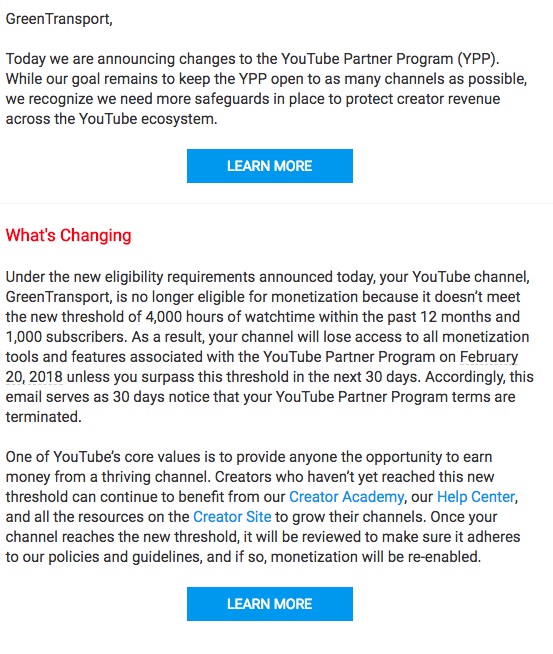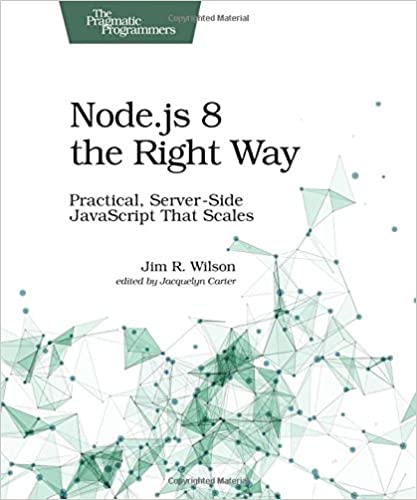; Date: Mon Jan 15 2018
Tags: YouTube »»»» YouTube Adpocalypse »»»» Online Video »»»»
Cries of "YouTube Adpocalypse" have been heard from certain YouTube Creators when advertising monetization has been denied. Some on YouTube are small-time "content creators" who are hoping to make it big by recording videos about how to knit sweaters, or make yogurt, or repair laptops, or whatever topic it is they're chasing. The carrot that was dangled in front of all of us is Monetization, meaning that Google would enable Adsense advertising, and the YouTube Creator could earn revenue. I have a couple channels where I'd enabled monetization, but hadn't gotten enough traffic on my videos that the revenue was worth getting excited over. Today, YouTube sent me the following notice telling me that monetization is being turned off on my channels. We can now expect more uproar from YouTube Creators - the AdPocalypse is Coming!

Bottom line problem is believing that the MegaMonolithCorporation that offered an open playing field where we could "earn money" will keep on offering that arrangement. MegaCorporations operate by their own rules, and once they get large enough they can't afford to interact with individuals. Someone whose YouTube account earns $10 a month isn't worth the time of the MegaCorporation, right? But that individual with the account earning $10 a month needs to see that goal - the carrot dangling in front of them - to keep on making videos in the dream of one day all that work being worthwhile.
Google may have signed YouTube's death warrant
That's a strong statement so let me explain.
The life-blood of YouTube is new video content. How many videos are uploaded every second? Not all of those are cat videos someone is sharing with friends. Many of those videos are meant to inform or educate lots of people. I repost a lot of those videos here on TechSparx - technology how-to videos are extremely important. How else are we to learn how to use all these gizmos?
In my opinion the individual video creator is just as important, if not more important, than the highly polished videos coming from a studio.
Ask yourself - how will the above announcement be received by an individual YouTube Creator whose channel doesn't match the bar set by Google?
Will they be encouraged to keep on creating videos? I suspect they'll be discouraged rather than encouraged. Over the last few months I've watched several Adpocalypse videos, and they've all stressed the importance of monetization as their encouragement to keep on creating videos.
I've been pondering getting into that business myself. Look around TechSparx, and for that matter my other site -
GreenTransportation, and you'll see I have a lot of things to say. Perhaps video could be a good adjunct. Speaking for myself, I'm now feeling discouraged.
What Google has to say
Let's turn to the horses mouth and see what Google has to say:
https://youtube-creators.googleblog.com/2018/01/additional-changes-to-youtube-partner.html
Google is expressing a wholistic attitude of trying of "protecting our creator ecosystem and ensuring your revenue is more stable." During 2017, the need to address certain issues (um... the Fake News epidemic?) meant taking actions to "prevent bad actors from harming the inspiring and original creators around the world who make their living on YouTube." Finally, despite the actions taken during 2017, "the number of channels making over six figures" has increased by 40%.
In other words, Google is taking the moral high ground they always take - that Google's wholistic vision is for their services to serve all stakeholders. They're claiming to have the interests of the small-time operation in mind - and to be creating environments in which we can earn revenue and build our own businesses.
I first heard Google spin this story nearly 20 years ago at an early meeting of AdSense publishers. One of the Googlers described their goal as creating a win-win-win-win situation where AdSense would serve the audience, the publishers, and the advertisors, by offering value to all. This blog post makes the same pitch ...
The blog post holds out one ray of hope. The notice I received by email (above) doesn't say there's a possibility to re-enter the monetization program. The blog post does say this:
On February 20th, 2018, we’ll also implement this threshold across existing channels on the platform, to allow for a 30 day grace period. On that date, channels with fewer than 1,000 subs or 4,000 watch hours will no longer be able to earn money on YouTube. When they reach 1,000 subs and 4,000 watch hours they will be automatically re-evaluated under strict criteria to ensure they comply with our policies. New channels will need to apply, and their application will be evaluated when they hit these milestones.
Whew? Sort of. A YouTube creator could bust their buns and reach the threshold, and maybe they'll be accepted back into the program. A new YouTube creator could do the same, apply to the program, and maybe they'll be accepted. ...But...
The difficulty of earning revenue by providing content for others
The history of open-monetization-for-the-public doesn't give us any comfort. A number of companies offer programs where "anyone" can sign up, start publishing stuff, and earn some revenue on the side. Various affiliate programs, advertising systems, and 3rd party websites allowing us to post content.
All those services tighten their rules from year to year. It gets tougher and tougher every year to earn a living this way.
I really did start with AdSense nearly 20 years ago. There were months where I earned $1200 in AdSense revenue - in the early days. Today I'm lucky to earn $50 a month, from a higher traffic volume on the same websites.
In 2009 I started as a writer with
Examiner.com, a Citizen Journalism website. Every so often Examiner would change their policies reducing the royalty rate, and the effective income dropped and dropped. Finally that site became so unsustainable that in July 2016 Examiner shut the whole thing down, despite having a huge overall traffic volume. There was essentially NO WARNING at all - Examiners had about 2 weeks to retrieve their content before the entire thing went dark. The parent company is presumably taking all that search engine page rank goodness from all the inbound links to Examiner articles, and using that to promote some other site.
I think it's a kind of pissing-into-the-wind exercise to expect a Big Mega Service run by a big MegaCorporation to actually care about an individual with a passion for knitting replica's of butterflies. That person may have a great talent for knitting to share, but ... does that mean the MegaCorporation will care?
Can't we expect that next year Google will find an excuse to ratchet the noose a little tighter? That they'll find some new higher threshold a YouTube Creator must hit before they're allowed to tap into the magic Monetization program?
Past reporting:
- A look into the YouTube Adpocalypse - Video Blogger shows how his revenue has dried up
- As Google commercializes YouTube, individual "creators" may be squeezed out
- The demise of examiner.com, what's it mean for citizen journalism?











